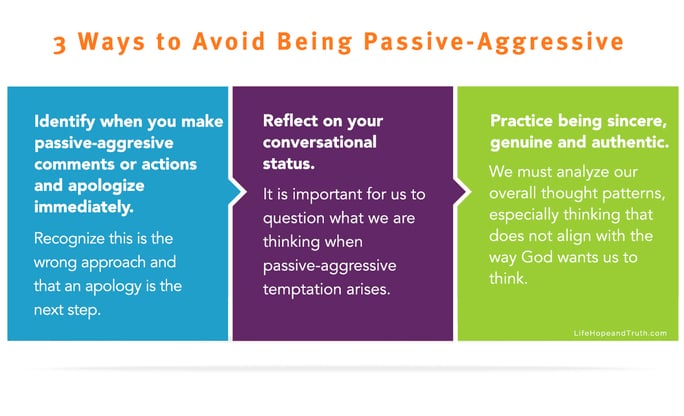Communication Styles: Passive-Aggressive Communication
In this finale in our series, we look at the least healthy of the four communication styles. Why is avoiding passive-aggressive communication so important?

All of us want to be more assertive in our communication, but we sometimes fall into comfortable but damaging patterns.
As we discuss the lowest of the low in this final post, we must remember that communication styles are not set. We always have a choice in how we communicate.
What is passive-aggressive communication?
If assertive communication is the gold standard, then passive-aggressive communication is the rusted, counterfeit penny of communication styles.
As with passive communication, there is an element of powerlessness and helplessness. And, as with aggressive communication, there is an element of attack and anger. Put those together, and you get lashing out aggressively, thinly veiled behind the appearance of being passive.
This makes the person communicating appear disingenuous and insincere. It is a form of deception, an attempt to alleviate some of the powerlessness we may feel. But nobody likes being lied to (Proverbs 12:22), and when the “root of bitterness” (Hebrews 12:15) is watered and encouraged by passive-aggressive communication, it does not lead to contentment, but to more discontentment.
Sometimes passive-aggressive communication sounds, or is applied, like this:
- “Nothing’s wrong. I’m fine.” (But then you don’t speak to the communication partner for hours.)
- “Yeah, okay. You just know everything, don’t you? You’re right.” (Sarcasm and lying, followed by little punishments for the other person and growing resentment in your mind.)
- “Why are you getting so upset? Is something wrong?” (Feigning curiosity and humble ignorance, when the problem and cause are well-known to both parties.)
- “Sure, we’ll try it your way, but we may want a way that everyone will like.” (Sharp insult, not said in jest, yet coupled with agreement to do what another says.)
- “This is really the best you can do? Never mind, I was just joking. This should work.” (Though the initial insult was seemingly invalidated as a joke, the insult was actually how the person really felt.)
What do we notice? Like passive communication, we see thoughts and feelings hidden and not communicated directly. Like aggressive communication, we see unhealthy attacks, insults and attempts to control the situation through unhealthy means. It’s the worst of both worlds.
Are there any benefits of passive-aggressive communication?
There are no benefits. With passive-aggressive communication, even the illusions of benefit cancel themselves out. A person who is at first seen as passive is later found to be angrily holding in the negative things that he or she really feels. When discovered, the aggression veiled under the disguise of passivity will sometimes hurt more than blatantly aggressive communication.
What are the consequences of passive-aggressive communication?
Take your pick: strained or destroyed relationships, loved ones never knowing what the person is truly feeling, others not really feeling comfortable around the person—all while the individual stays stuck in a feeling of helplessness.
The biggest consequence? Since it is simply poor communication, using it does not add any mental, spiritual, physical or social benefit to the individual’s life or to the lives of others. It’s like putting a Band-Aid on someone who has the flu. In other words, useless. Completely useless. Yet we all seem to allow it to creep into our speech at times.

How can I avoid being passive-aggressive and be assertive instead?
- Identify passive-aggressive comments (or actions) and repair them immediately. When we recognize this wrong approach, we can quickly stop it from going any further. Repenting to God is the first step because being passive-aggressive is a form of lying, which is a sin against God (Exodus 20:16; Psalm 51:4). Then apologizing to the other person is the next step in repairing the relationship. It might sound like this:
- “I’m sorry for that cynical, sarcastic comment I made. I was wrong to take that approach. Let me try to tell you how I feel about this in a more honest way.”
- “I really didn’t agree with what you said. I was getting so mad about it that I was criticizing you to others. Please forgive me for going behind your back and not coming to you privately, as I should have.”
- “I’m sorry for my behavior during our conversation. I was pretending that I was okay with what you were saying, while slyly poking holes in what you said, by pretending to ask innocent questions. They were not innocent. I should have just said that I disagreed with you and told you why.”
- Reflect on your conversational status often during communication. It is important for us to question what we are thinking when passive-aggressive temptation is around:
- “Am I thinking godly thoughts?”
- “Am I making snide remarks under my breath?”
- “Am I really being honest with how I am responding to this?”
- “Am I really okay with this, or am I just feigning agreement and planning to undermine it later?"
- Practice being sincere, genuine and authentic always, not just during communication. We must analyze our overall thought patterns, especially thinking that does not align with the way God wants us to think. We may genuinely and sincerely dislike the idea someone has for a new project, and we could feel like saying all the negative things that popped into our minds, but this is a chance to focus on what we have control over—our thoughts and what we do with those thoughts.
Remember that we can choose to seek reconciliation rather than revenge in such situations. We can choose to speak our minds with tact and gentleness rather than engage in sneaky subterfuge.
Some scriptures to help us overcome passive-aggressive communication
- “He who hates, disguises it with his lips, and lays up deceit within himself” (Proverbs 26:24).
- “Though his hatred is covered by deceit, his wickedness will be revealed before the assembly” (Proverbs 26:26).
- “You shall not hate your brother in your heart. You shall surely rebuke your neighbor, and not bear sin because of him” (Leviticus 19:17).
- “Moreover if your brother sins against you, go and tell him his fault between you and him alone. If he hears you, you have gained your brother” (Matthew 18:15).
- Therefore, putting away lying, ‘Let each one of you speak truth with his neighbor,’ for we are members of one another. … Let all bitterness, wrath, anger, clamor, and evil speaking be put away from you, with all malice. And be kind to one another, tenderhearted, forgiving one another, even as God in Christ forgave you” (Ephesians 4:25, 31-32).
There is always a choice. We can choose to be assertive and healthy in our communication, or we can choose to be passive, aggressive or passive-aggressive.
The Bible, modern research and a plethora of human experience all agree that assertive communication provides the best results and works the best. Choose it and see the results for yourself.
For more insights on communication, read our articles on “The Joys and Challenges of Communication.”
Date Posted: February 18, 2020

 by Eddie and Shannon Foster
by Eddie and Shannon Foster

